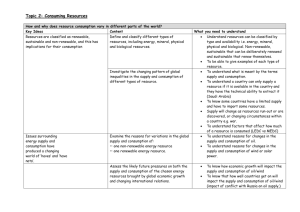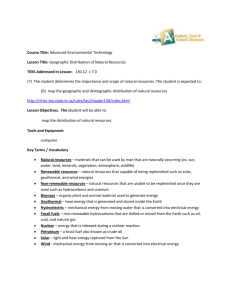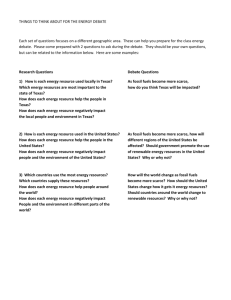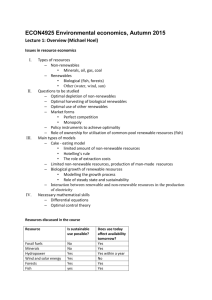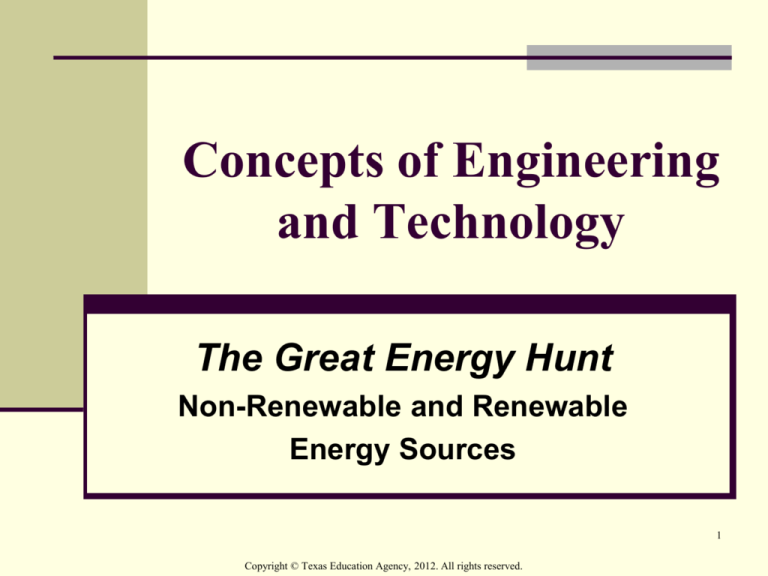
Concepts of Engineering
and Technology
The Great Energy Hunt
Non-Renewable and Renewable
Energy Sources
1
Copyright © Texas Education Agency, 2012. All rights reserved.
Technical Communication
130.362.9 The student understands the
opportunities and careers in fields related to
physical and mechanical systems.
Engineers must possess strong technical oral
and written communication skills.
Green Energy is a growing field in the
engineering industry. Our country is facing an
energy crisis. Engineers will determine what
energy sources are the best solutions and
why.
2
Copyright © Texas Education Agency, 2012. All rights reserved.
Technical Terms & Definitions
The terms and definitions listed below are discussed in
this lesson. Please review before proceeding with this
lesson.
Terms
Definitions
Green Energy
Non-Renewable
Energy
Is a term describing what is thought to be
environmentally friendly sources of power
and energy. Typically, this refers to renewable
and non-polluting energy sources.
.
Energy that cannot be replaced once it is
used or energy that is not being replaced
as fast as it is being used.
3
Copyright © Texas Education Agency, 2012. All rights reserved.
Technical Terms & Definitions
The terms and definitions listed below are discussed in
this lesson. Please review before proceeding with this
lesson.
Terms
Renewable
Energy
Definitions
Is energy which comes from natural
resources such as sunlight, wind, rain,
tides, and geothermal heat, which are
renewable (naturally replenished).
4
Copyright © Texas Education Agency, 2012. All rights reserved.
Non-Renewable & Renewable
Energy Sources
In this lesson, we will research Non-
Renewable and Renewable Energy
Sources and determine which energy
sources are the best solutions to solve
the United States’ energy crisis.
5
Copyright © Texas Education Agency, 2012. All rights reserved.
What are the Non-Renewable
Energy Sources?
The non-renewable energy sources are:
Coal
Nuclear Energy
Natural Gas
Petroleum
Propane
Copyright © Texas Education Agency, 2012. All rights reserved.
6
What are the Renewable Energy
Sources?
The renewable energy sources are:
Geothermal
Ethanol
Biomass
Hydrogen
Hydroelectric Power
Solar Energy
Wind Energy
7
Copyright © Texas Education Agency, 2012. All rights reserved.
The Great Energy Hunt
Non-Renewable
Energy Sources
Copyright © Texas Education Agency, 2012. All rights reserved.
Coal Non-Renewable
Coal is a readily combustible black or brownish-black
rock with a composition, including inherent moisture,
consisting of more than 50 percent by weight and more
than 70 percent by volume of carbonaceous material. It
is formed from plant remains that have been compacted,
hardened, chemically altered, and metamorphosed by
heat and pressure over geologic time.
Copyright © Texas Education Agency, 2012. All rights reserved.
Natural Gas Non-Renewable
Natural Gas is a gaseous mixture of hydrocarbon
compounds, the primary one being methane.
Note: The Energy Information Administration
measures wet natural gas and its two sources of
production, associated/dissolved natural gas
and non-associated natural gas, and dry natural
gas, which is produced from wet natural gas.
Copyright © Texas Education Agency, 2012. All rights reserved.
Petroleum 1 Non-Renewable
Petroleum is gasoline, diesel fuel, and propane. Most
gasoline is made from crude oil, formed from remains of
plants and animals (diatoms) that lived hundreds of
millions of years ago. Diesel fuel is used in diesel
engines found in most freight trucks, trains, buses,
boats, and farm and construction vehicles. Propane is
an energy-rich gas that is found mixed with natural gas
and oil..
Copyright © Texas Education Agency, 2012. All rights reserved.
Petroleum 2 Non-Renewable
Petroleum is hydrocarbon mixtures. Included are
crude oil, lease condensate, unfinished oils, refined
products obtained from the processing of crude oil,
and natural gas plant liquids. Note: Volumes of
finished petroleum products include nonhydrocarbon compounds, such as additives and
detergents, after they have been blended into the
products.
Copyright © Texas Education Agency, 2012. All rights reserved.
Propane Non-Renewable
Propane (C3H8): A normally gaseous straight-chain
hydrocarbon. It is a colorless paraffinic gas that
boils at a temperature of -43.67 degrees Fahrenheit.
It is extracted from natural gas or refinery gas
streams. It includes all products designated in
ASTM Specification D1835 and Gas Processors
Association Specifications for commercial propane
and HD-5 propane.
Copyright © Texas Education Agency, 2012. All rights reserved.
The Great Energy Hunt
Renewable
Energy Sources
Copyright © Texas Education Agency, 2012. All rights reserved.
Biomass Renewable
Biomass is plant matter and animal waste that
can be harvested to create bio-energy in the
form of electricity, heat, steam and fuels.
Copyright © Texas Education Agency, 2012. All rights reserved.
Ethanol Renewable
Ethanol (CH3-CH2OH) is a clear, colorless, flammable
oxygenated hydrocarbon. Ethanol is typically produced
chemically from ethylene, or biologically from fermentation of
various sugars from carbohydrates found in agricultural crops
and cellulosic residues from crops or wood. It is used in the
United States as a gasoline octane enhancer and oxygenate
(blended up to 10 percent concentration). Ethanol can also be
used in high concentrations (E85) in vehicles designed for its
use.
Copyright © Texas Education Agency, 2012. All rights reserved.
Geothermal Renewable
Geothermal Energy is a form of renewable
energy derived from heat deep in the earth’s
crust.
Geothermal Energy is also used for electricity
production.
Geothermal Power Generation is used today
throughout the world where good geothermal
resources exist, including many locations in the
western United States.
Copyright © Texas Education Agency, 2012. All rights reserved.
Hydroelectric Power
Renewable
Hydroelectric Power is a renewable energy
source. It produces the most electricity in the
United States. It accounts for 6% of total
U.S. electricity generation and 67% of
generation from renewables in 2008.
Copyright © Texas Education Agency, 2012. All rights reserved.
Hydrogen Renewable
Hydrogen is the lightest of all gases, occurring
chiefly in combination with oxygen in water;
exists also in acids, bases, alcohols, petroleum,
and other hydrocarbons.
Copyright © Texas Education Agency, 2012. All rights reserved.
Solar Energy Renewable
Solar Energy is the radiant energy of the sun,
which can be converted into other forms of
energy, such as heat or electricity.
Copyright © Texas Education Agency, 2012. All rights reserved.
Wind Energy Renewable
Wind Energy is kinetic energy present in wind
motion that can be converted to mechanical
energy for driving pumps, mills, and electric
power generators.
Copyright © Texas Education Agency, 2012. All rights reserved.
Quiz 1 – Test Your Energy Knowledge
Take the energy quiz to test your knowledge
of Non-Renewable and Renewable Energy
Sources.
Copyright © Texas Education Agency, 2012. All rights reserved.
Quiz 2 - What is Your Energy IQ?
Complete “What is your energy IQ?”
from API
http://www.apienergyarcade.com/energyiq/
Copyright © Texas Education Agency, 2012. All rights reserved.
Assignment – The Great Energy
Hunt
Research and create a presentation about a
non-renewable or renewable energy source
assigned by your teacher.
Complete The Great Energy Hunt
assignment.
Present The Great Energy Hunt assignment.
Copyright © Texas Education Agency, 2012. All rights reserved.
References
Dictionary.com
http://www.dictionary.com
U.S. Energy Information Administration
http://www.eia.doe.gov/glossary/glossary_a.htm
25
Copyright © Texas Education Agency, 2012. All rights reserved.
References
Energy4Me.org
http://www.energy4me.org/educators/Teacheractivities.htm
U.S. Department of Energy
http://www1.eere.energy.gov
26
Copyright © Texas Education Agency, 2012. All rights reserved.

